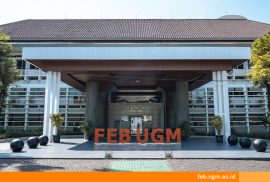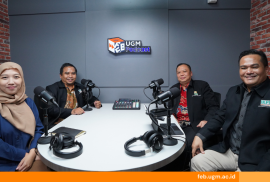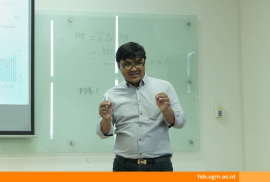The footsteps of the UGM Faculty of Economics and Business (FEB) academic community are worthy of applause and admiration. Elan Satriawan, M.Ec., PhD, Lecturer and Researcher at the Department of Economics, has successfully conducted several collaborative researches with leading researchers both nationally and globally. Much of the research has been published in Tier-1 international journals.
Elan succeeded in publishing an article that was the result of an international collaboration with the 2019 Nobel Prize winner in economics, Abhijit Banerjee of the Massachusetts Institute of Technology (MIT) in 2023. Other collaborators in this research were Rema Hanna (Harvard University), Ben Olken (MIT), and Sudarno Sumarto (TNP2K). This research, which evaluates the Non-Cash Food Assistance Program (BPNT) in Indonesia to improve the welfare of poor and vulnerable families, was published in the world-renowned journal American Economic Review (Banerjee et al., 2023). As stated in this publication, the evaluation results show that the BNPT program can significantly improve the welfare of beneficiary families, namely poor and vulnerable families.
In addition to collaborating with international researchers, Elan’s most recent publication was with the Minister of Finance, Sri Mulyani Indrawati, and the Head of the Center for Macroeconomic Policy at the Fiscal Agency of the Ministry of Finance, Abdulrahman, who is also an alumnus of FEB UGM. In the paper published in the Bulletin of Indonesian Economic Studies, they examined fiscal policy in Indonesia after the COVID-19 pandemic. The resulting research provides the latest picture of economic developments in Indonesia, both from the fiscal side and monetary policy after the COVID-19 pandemic subsided in Indonesia (Indrawati et al., 2024).
Elan explained that the publication explained the fiscal policy in Indonesia after the COVID-19 pandemic, particularly in terms of budget utilization and resource mobilization efforts, including the challenges faced in developing the economy and improving people’s welfare in the future. This publication touched on the positive aspects of fiscal policy during the pandemic, including the return to a primary budget surplus, which was last achieved in 2012. On the other hand, this publication also conveys the challenges of achieving a golden Indonesia in 2045 by improving tax administration and the importance of reforming inefficient budget allocations, especially energy subsidies and alternative infrastructure financing.
Elan is an economist actively involved in national and international collaborative research on the economics of development, poverty reduction, social protection, education and health policies in Indonesia. In addition to being an academic at UGM, Elan is also an expert to the Minister of Finance and Chair of the Policy Working Group of the National Team for the Acceleration of Poverty Reduction (TNP2K), a think tank that provides policy input on poverty reduction to the Vice President and Ministers/Heads of TNP2K member institutions.
As an academic, Elan revealed the challenges of writing scientific publications, especially those that can penetrate prestigious journals. It is difficult to publish research in journals with high academic weight and impact in the Indonesian research and policy landscape.
“The challenge is more about time management, especially for me personally, who has to allocate my time to carry out my role as an academic and researcher at a government think tank,” he said on Wednesday (4/24).
Still, Elan has tips for staying productive while conducting research. One way is to focus on research in your area of expertise. Research and publications with high academic weight and policy contribution are produced by focusing on expertise.
The next tip is that Elan sees the importance and benefits of collaboration in producing research and publications with national and international partners.
“Collaboration will synergize the expertise of each researcher, thereby increasing the scientific weight of the research. “Moreover, by collaborating, the research burden becomes ‘lighter’ because it is shared with other collaborators,” he explained.
Meanwhile, the Dean of FEB UGM, Prof. Dr. Didi Achjari, M.Com., Ak., C.A., said that FEB UGM encourages faculty and students to make their best intellectual contributions with high quality and valuable scientific work to build thought leadership. FEB UGM has developed various programs to help improve the quality of research and publications in the academic community. These include the provision of research grants and support for the implementation of international research collaboration seminars and journals.
“Faculty who successfully publish their work in national and international journals will receive publication incentives. “FEB UGM has also updated the publication incentive scheme to align with the new mission and vision by making the Australian Business Deans Council (ABDC) Journal Quality List and the Chartered Association of Business Schools (CABS) Academic Journal Guide the main rankings,” he explained.
Reportage: Kurnia Ekaptiningrum







